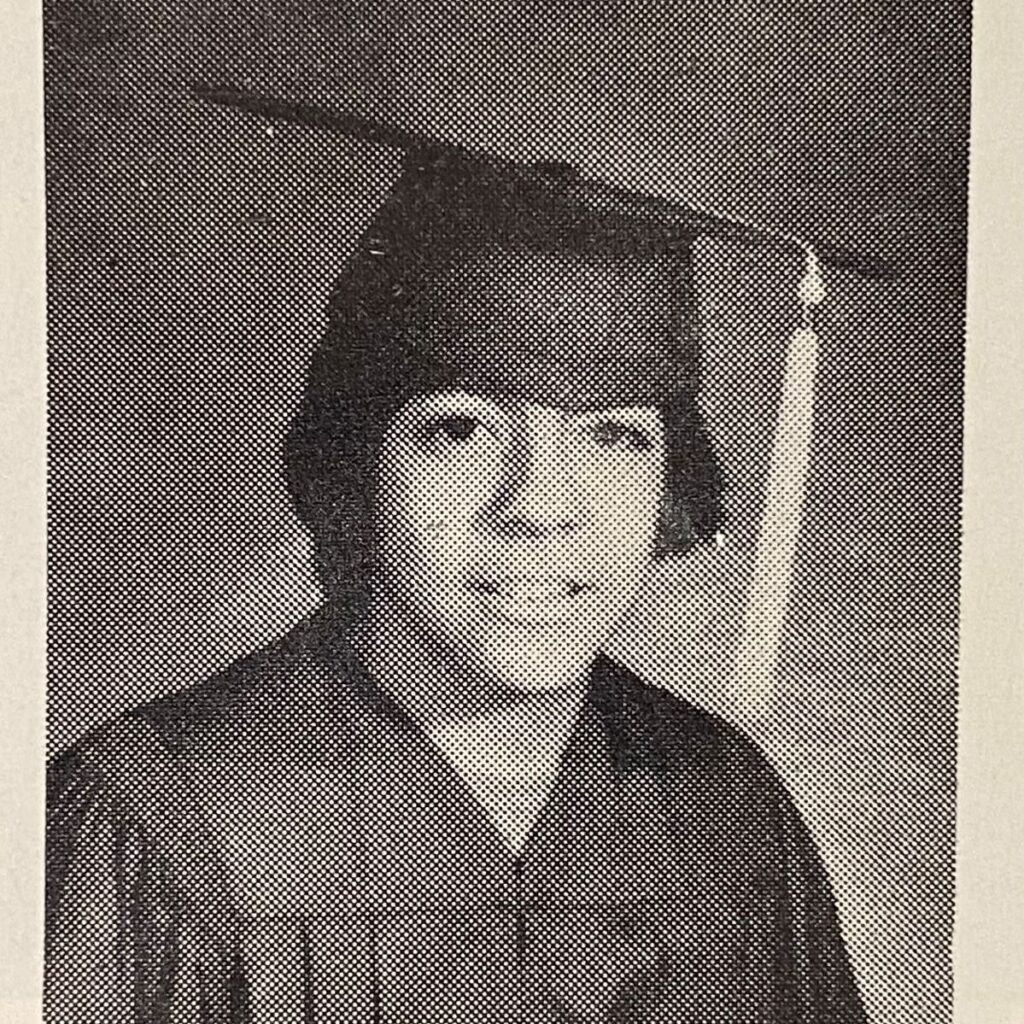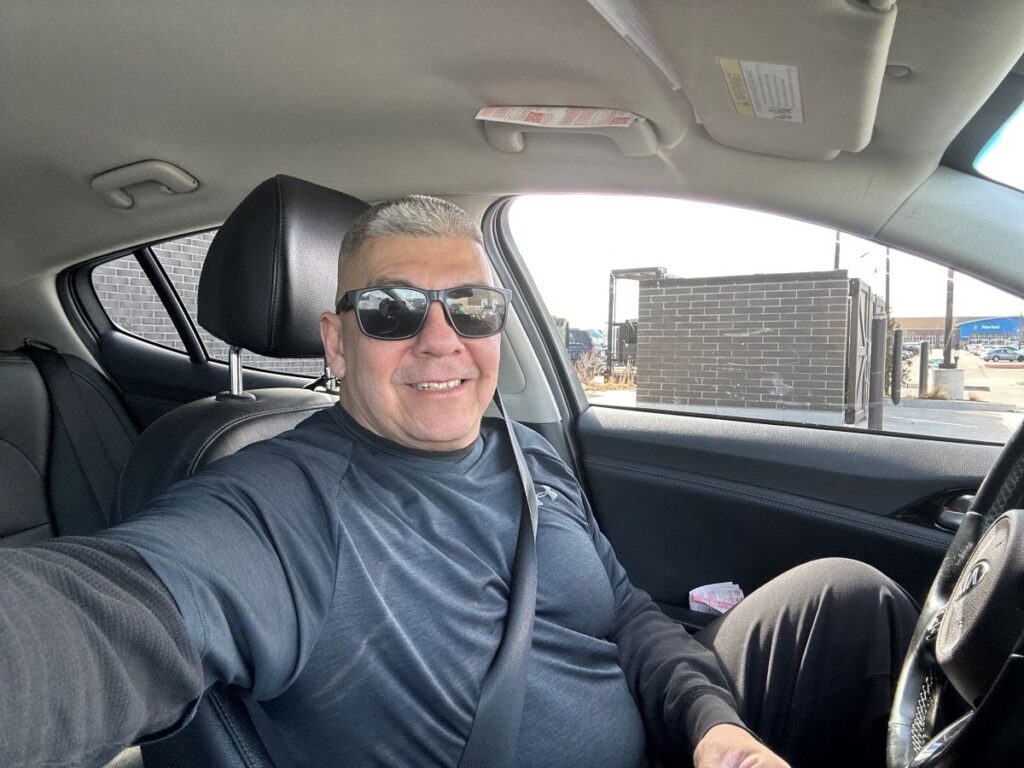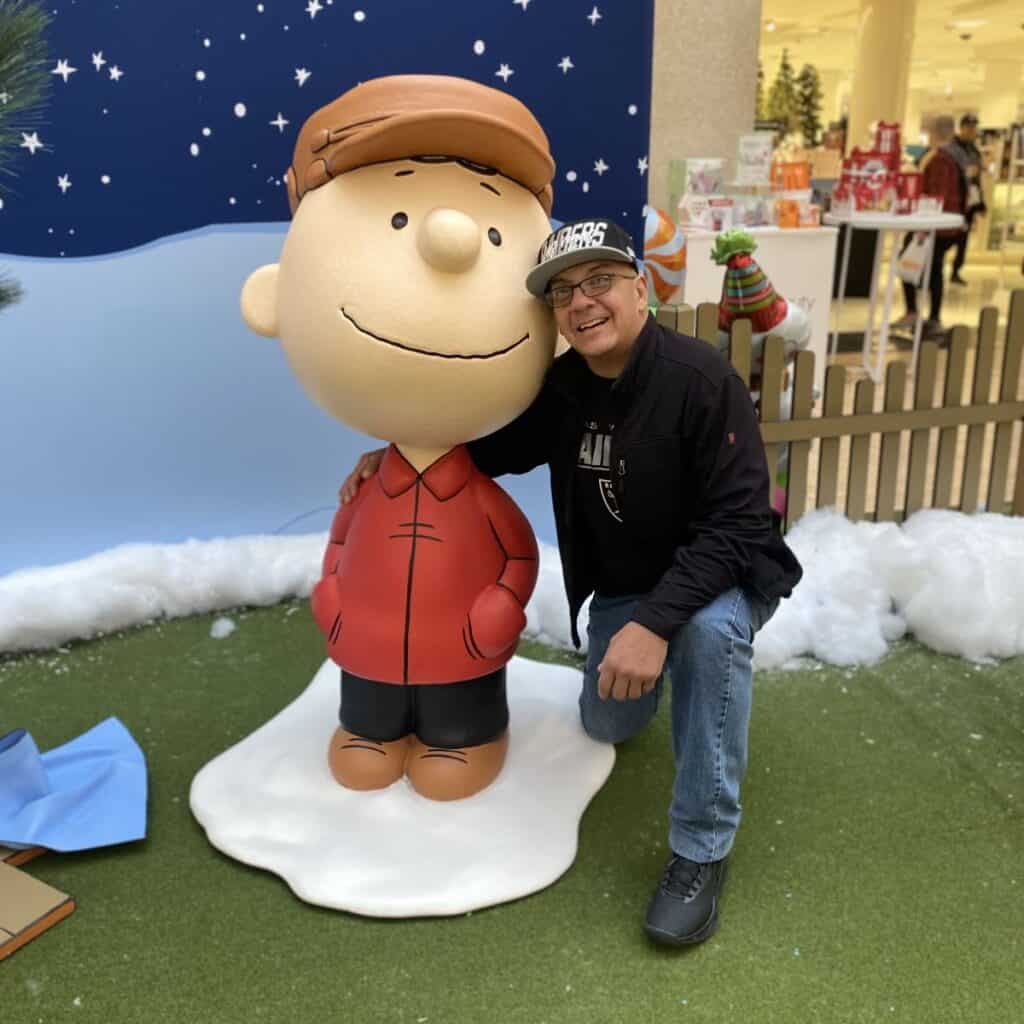Joseph Rodriguez
In 1982, Joseph was one of the first children sentenced to life without the possibility of parole in Illinois for a crime that occurred when he was 16. After spending over 35 years behind bars, he now works hard to make up for lost time with family and friends.
“As long as I don’t get back in a cage, I’m happy. And every time I wake up, I look in the mirror, ‘Joey, are you doing the right thing?’ And I can say to myself, ‘Yeah, I’m doing good.’ So I’m happy no matter what tomorrow brings.” – Joseph Rodriguez
Joseph feels like the majority of his life has been defined by a terrible and uncharacteristic decision. “One or two hours of my time, when I was 16: that ruined everything,” he says. “And not just for me, because at the time, I didn’t realize that when I dragged myself into that situation, I dragged so many other people: my mother, my sister, my brother, all my relatives.” Joseph knows that he cannot change what happened, but instead thinks of his release as an opportunity to do good for himself, his family, and his community. “From the point that I got out [of prison] to the point where I’m at now, all I’ve ever tried to do is try to make up to my family, make up to myself, and try to be the best person I possibly can be,” he explains.
Misplaced Loyalty
Joseph, or Joey, grew up in Chicago’s Pilsen neighborhood with his mother, two sisters and younger brother. “I was always a good child,” he remembers. “I was always a person who tried to make my mother as happy as possible, make her proud.” This pushed him to do well in school. He says that “from third grade all the way up to junior high, I guess you’d probably say preteens, I was actively going to school.”
Once Joseph was in 7th and 8th grade, however, external social pressures came into play. “I started being associated with the neighborhood kids, the older kids,” he explains. “That’s how I got involved with the gangs.” While at the time he believed these older teens were his friends, in retrospect, he feels differently about the relationships and their power dynamics. “I realized when I got older that I was just being manipulated, you know,” he says.
The peer pressure to actively participate in the gang only increased once Joseph got to high school. “We had conflicts with numerous different associate gangs around the neighborhood and we [were] just going back and forth fighting,” Joseph recalls. “We’re brought up as being, I guess, warriors, or fighters, for our neighbors,” he says. “I was just trying to be as loyal as possible to the people that I thought were my friends.”
By early December of 1981, the violence had escalated and Joseph, who was 16 years old, was on the run following a deadly gang-related shooting. He realized there were few options available to him. “I was instantly sorry at the time,” he explains, “but I couldn’t take that back.” Through a lawyer, he surrendered to the Chicago Police for two murders. “Once I caught my case it was just too late,” he stresses. “I couldn’t control anything, and everything would just spin out of control.”
“I Was Completely Lost”
After meeting with police, Joseph was immediately sent to the Audy Home. “Audy Home” was the popular name for the Cook County Juvenile Temporary Detention Center, reflecting its longer history as the Arthur J. Audy Home, a detention center and group home created as part of Cook County’s Juvenile Court. Founded in 1899, Cook County’s Juvenile Court was the first separate American court for juveniles. Although the separate court system and the facility was progressive in that it recognized children as inherently different from adults, the Audy Home had developed a dark reputation by the time Joseph was detained there.
“I was completely lost,” Joseph says of his arrival to the detention center. “Every step of the way, I was like, ‘Oh my god, What am I getting into?’ I remember praying constantly, every day: ‘Help me. Help me.’”
Thankfully, the priest from Joseph’s home parish also regularly visited the Audy Home, meaning there was a familiar and comforting face at the the detention center Joseph remembers him saying, “‘As much a disappointment it is to see you, I’m glad that you’re here so I can talk with you, so I can mentor you, and try to find out what got you in the situation.’” Compared to the other adults Joseph encountered in the criminal legal system early on, it felt like the priest had a holistic understanding of him as a person. “He knew me growing up and being part of the gang. He heard my confessions, you know,” he explains with a laugh. “It was kind of like a blessing in disguise to see him.”
On the day of his 17th birthday, Joseph was transferred to the adult system and placed in Cook County Jail. Joseph felt more protected in the jail than some, despite being so young. “Being in a gang and growing up with all the individuals that are already in the adult system, people were actually looking out for me,” Joseph notes. Nevertheless, Joseph concludes that all this was “pretty traumatic as a child.”
Charged with two counts of murder, Joseph was aware of the sentence he faced during trial. “I never really contested getting found guilty for the actual crime,” he explains. “The only thing I was actually contesting was the sentencing: why so much time? That’s the only thing I was always asking: ‘Hey, why so much time for a juvenile? I’m a juvenile.’” Joseph was incarcerated in pretrial detention for about 18 months, though the trial itself took “between six and eight hours. And I was sentenced to natural life.”
Lifelines of Support
Joseph began his post-conviction incarceration in Joliet, then later transferred downstate to Menard Correctional Center, about six hours southwest of Chicago. There, he again experienced some level of protection thanks to his gang affiliation. “The gangs were actually a double[-edged] sword,” he explains. “They’re the ones that actually got me into the situation I got into. But once I got locked up, they were the ones that actually kind of saved my life, to be honest with you, because I could have gotten eaten up alive in there.”
Then, in 1987, Joseph submitted a compassionate transfer request, in which he asked to be closer to family to make visitation easier. The request was granted, and he was transferred to Stateville Correctional Center, just outside Chicago. The move was transformative. “Once I started seeing my mom again, let’s just say the whole world opened up again,” he says.
Being in Stateville also meant that Joseph could see his daughter, who was born in November of 1981, less than a month before he was incarcerated. Although he couldn’t be with his young family in the way he wanted, he could still foster relationships with those he cared about, and those who cared about him. “Every single day, I felt that loneliness while I was in Menard. But once they brought me back [to the Chicago area], and I was able to see my family, my daughter, my ex-girlfriend, that brought me back.” He would tell himself, “I have people that care for me. Now, I feel like I’m worth something. I feel the value of love again.”
These renewed relationships with loved ones gave Joseph a sense of purpose as well as positive reinforcement for self-improvement. “From 17 to 23, I was still trying to figure out who I was, and I was still involved with the gangs,” he says. Things started to crystalize in his early-to-mid 20s as the reality of his sentence sank in. “I accepted the fact that okay, I got natural life; me getting out wasn’t in the near future,” he explains. “So I started thinking, ‘Okay, well, this is the life that I have. I’m gonna have to make the best of it.’ … I just started doing my time.” He adds, “I remember I stopped messing up, I remember that I made my mind up — stop fighting, stop trying to be somebody that never was. So I stopped getting in trouble. … Then things got a lot better in my life.”
Staying connected to family throughout the rest of his incarceration gave Joseph a much-needed sense of hope. “I realized that even though I’m suffering,” he says, “I still have my family, I still have the people that loved me.” His support system also helped him feel stable. “People were always sending me money, taking care of me financially,” he notes.
Joseph also discovered that support and connection sometimes ebbed and flowed during lengthy incarceration. “During the later part of the years, when my mom passed away, when I started losing the connections with certain family members or friends,” he trails off, then adds, “all that disappears after a long time. And it gets more difficult.” Losing his mom while in prison was a pain Joseph will never forget. “It was one of the hardest moments in my life,” he concludes. Joseph credits his sister Cathy for helping him grieve the loss of their mother, for being a constant source of love and care when others lost touch, and for being a financial lifeline when he didn’t have any other options. “My sister kept me afloat,” he insists.
Joseph also speaks fondly of the friendships he developed in prison. “I only have a handful of friends; I can count them on my one hand,” he says. “And as ironic as it is, those friends are the people I met while I was incarcerated.” The extraordinary circumstances of youthful incarceration allowed Joseph to connect with these friends deeply and authentically. “There’s a difference between the friends that I had when I was a free person as a juvenile, then the friends that I developed when I was locked up,” he says. “My true friends, I met them inside prison where they were going through the same struggles as I was going through. They were lost, just as I was lost, you know. And each day we had great conversations, that’s how we developed our friendship. That’s how we grew: we grew up together.”
“I Knew … I Was Going to Get Out”
In June of 2012, Joseph heard from a friend that there was news relevant to him on TV. “They called me in and said, ‘Listen to this: something just came up on CNN about the juveniles being sentenced to natural life,’” he recalls. The news about the US Supreme Court’s Miller v. Alabama decision was running on the ticker at the bottom of the screen, explaining how the court had just decided that mandatory sentences of life without parole for children under 18 was unconstitutional. Joseph had already been incarcerated for over 31 years. “I knew from that point, when I saw it on the CNN report, I was going to get out,” he says.
Joseph took this news as an opportunity to do even more work to demonstrate the positive changes in his life, hoping that anything and everything would look good to a judge. He had earned his GED long ago, but decided to go back to school. “Instead of just going to work, going to the yards, going to the gym, watching TV, I started being more proactive.” Although nothing happened overnight, Joseph marks that moment as the beginning of the end of his time in prison. “My whole life started changing,” he says.
A Bumpy Start to a “Good Transition”
Joseph remembers nearly every detail from his resentencing hearing that was granted after the Miller decision and the days that followed. “The resentencing (itself) was very, very difficult for me,” he explains, “because I had to go through a whole terrible situation that I went through as a kid, and basically plead for my life.” The tone of the hearing shifted immediately, however, when the judge not only reduced Joseph’s original sentence, but also released him on time served.
Back in the courthouse holding cell with his lawyers, Joseph celebrated. But the relief was short-lived. Correctional officers informed him he needed to go back to Stateville Correctional Center to be “processed out,” and it was already too late for that to happen that day. He wasn’t released until late the next night, and there was an additional mix-up with his pre-approved parole plans. Instead of sending him to his sister’s house, IDOC released him to a halfway house on the South Side without notifying his family in advance.
Thus, at 9 PM, the correctional officers kicked him out of Stateville with a $40 regional train ticket and told him that if he didn’t get to the halfway house by 11 PM, he’d be in violation of the conditions of his Mandatory Supervised Release (MSR). “They already had me scared,” Joseph recalls. On the train, he started to panic. “I saw people with their cell phones … I was embarrassed to ask [someone] to use the phone because I didn’t know how to use a cell phone.” When Joseph was arrested in the early 1980s, cordless home phones were all the rage; he had never used a cell phone. One man on the train and, later, two women outside the station helped him call his sister so he could explain what happened, but Joseph was frantic. The two women, “they were like patting me,” he explains. “They said, ‘Calm down, you will be alright.’” Then, finally, his sister arrived. Against all odds, Joseph arrived at the halfway house on time.
Despite that unnecessarily stressful ordeal on his first night home, Joseph thinks of his reentry journey as positive overall. “I had a good transition to be honest,” he says, “because I had a good family support system with a good group of friends that actually kept me grounded and kept me focused.” He adds that, “just being able to see my daughter, my grandkids, my sister, all her grandkids … to hold my brother, those are blessings that I have now. And I appreciate them every day.”
After leaving prison, Joseph began as a production line worker and was steadily promoted into a successful career doing machine maintenance. However, the physical labor started to catch up with him. In early 2023, he felt like he had no other option but to quit. “Working in the freezers wound up giving me arthritis in my knees where it’s hard to walk sometimes,” he explains. “Plus, I was on the third shift all the time. And I really had no life.” Thankfully, he was able to find a new job a couple of months later at an electrical equipment manufacturing company doing testing.
Joseph knows his lived experience is a powerful tool. He sees the ways in which he has changed and grown over time, and how he has learned how to better manage his emotions. “I don’t put myself in the situation where I know my rage is gonna come out again,” he explains. And he wants to share this insight. He says he would like to see more “opportunities where people like myself and other people that were incarcerated could go give their testimonies … share that with people who are going through similar circumstances as we did as kids.” He believes that this might be one of the best interventions; an opportunity to wake young people up and say, “‘Listen, this is your path unless you decide different (sic). Right now’s the time to decide different.’” Joseph adds, “changing somebody’s life, that would be a positive.”
More from the “More than a Conviction” Project
Up Next
Read the story of another returning citizen who was sentenced to juvenile life without parole and is now free
Read anotherRead other stories
Discover the impacts of juvenile life without parole sentences in Illinois from additional perspectives
Learn moreReport
Read the Restore Justice report on juvenile life without parole and extreme sentencing in Illinois
Read the report



